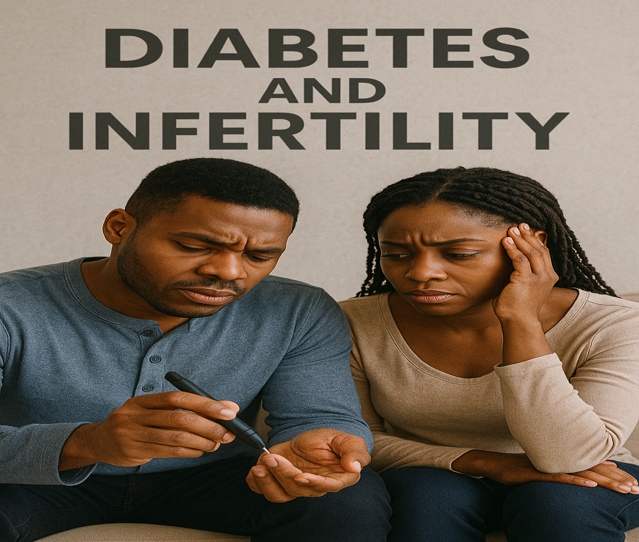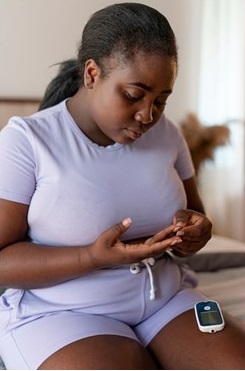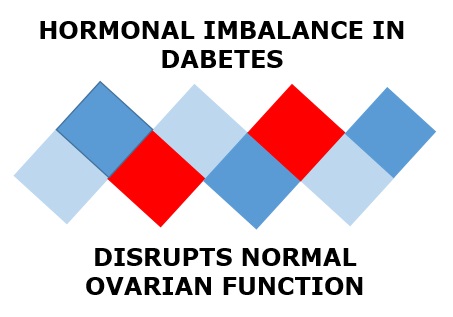Can Diabetes Affect Your Fertility? What Every African Needs to Know
By: Chinonso Cynthia Ukah. BNSc, RN, RM, RPHN. Freelance Health Writer. Medically reviewed by F. Akinwalere, HND.

A diabetic couple worried about their fertility status.
Introduction
In many parts of Africa, infertility is often wrongly assumed to be a woman’s issue. This belief overlooks the significant impact that various health conditions such as diabetes can have on both male and female reproductive health.
Diabetes, widely known as a disorder of blood sugar metabolism, has been identified in several studies as a contributor to progressive infertility. It affects men and women as well, with female diabetics more likely to experience fertility challenges.
Research shows that up to 90% of people with diabetes suffer from complications such as reduced libido, impotence and infertility. There are also reports of mental health issues, and low self-esteem.
Despite these, reproductive health issues related to diabetes are frequently overlooked compared to other complications of diabetes. Also, there is currently no standardised treatment protocol specifically targeting diabetes-induced reproductive dysfunction.
This article aims to explore the relationship between diabetes and infertility in both men and women, highlight the underlying mechanisms, and advise on the proper actions to take when trying to conceive.

An African diabetic woman preparing to check her blood sugar. Image credit: Freepik
There are two major diabetic factors known to affect fertility.
Related:
Type 1 Diabetes Mellitus: An Explainer for Africans
Type 2 Diabetes: What Africans Need to Know
Infertility is the inability of a couple to conceive after 1 or more years of regular unprotected sex.
The World Health Organisation specifically defines it as a disease of the male or female reproductive system, signifying that the issues surrounding conception are not always the fault of a woman as some Africans perceive. It’s been widely documented that 10-30% of fertility issues in couples are from the male sexual partners.
There are different factors that can affect a person's fertility. They include hormonal problems, structural issues, lifestyle habits, and certain health conditions.
One of the medical conditions that is suspected to affect fertility in both men and women is diabetes. It may not always be obvious at first, but its impact on hormones and reproductive functions can make conception difficult for many couples.
Related:
Infertility: Causes in African Women and Men with Prevention Tips
Infertility in African Women: All You Need to Know
Male Infertility in Nigeria: Causes, Symptoms, Diagnosis and Treatment
All levels of the male reproductive system are affected by diabetes - pre-testicular, testicular and post-testicular levels:
Diabetes affects parts of the brain that controls fertility, that is, the hypothalamus and pituitary gland. This results in hypogonadotropic hypogonadism (HH), a hormonal imbalance more common in men with type 2 diabetes (25 - 40%) than those with type 1 diabetes (less than 10%).
Section of the brain showing areas that diabetes affects to cause a type of hormonal imbalance. Click on image to enlarge.
In HH, the brain fails to produce enough hormone (gonadotropin-releasing hormone (GnRH)) responsible for starting the process of testosterone and sperm production (the major components of fertilisation). Research suggests that this could be due to processes that occur in diabetes, which are beyond the scope of this blog to elaborate on.
Testicular Level:
.jpg)
Diabetes can affect testicular structure and function.
The major changes at this level are seen in the structure and function of the testes (the organs housed within the scrotum beneath the penis). Studies involving men with diabetes have shown that diabetes reduces testicular weight and volume. This can impair sperm production thereby contributing to male infertility.
Post-Testicular Level:
.jpg)
Post-testicular reproductive structures may also be affected by diabetes.
At this level, the accessory sex organs are affected. These organs do not produce sperm directly but support sperm development, maturation, nourishment, and delivery. They may be affected by diabetes as described below:
1. Erectile Dysfunction (ED) - Erectile dysfunction is defined as the inability of a man to get or keep an erection. Diabetes damages the nerves and blood vessels that help with erections, making it hard to have sex and get a woman pregnant.
2, Decreased Libido (Sex Drive) - Men with diabetes may lose interest in sex. This is due to high blood sugar, stress, or low testosterone, making them less likely to try for a baby.
3. Poor Sperm Quality - Diabetes can affect the health of the sperm cells causing them to move too slowly, look abnormal, or be too few. This makes it harder for the sperm to reach and fertilise the woman’s egg.
4. Retrograde Ejaculation - This is when semen goes into the bladder instead of coming out through the penis. It happens because diabetes can damage the nerves that control ejaculation, making it hard to release sperm properly.
5. Hormonal Imbalance - Diabetes can reduce testosterone levels in men. This hormone is needed to make sperm and keep a healthy sex drive. Low testosterone means lower fertility.
6. Oxidative Stress - High blood sugar causes harmful chemicals known as free radicals and Advanced Glycation End Products (AGEs) to build up in the body. These chemicals can damage the sperm and reduce their ability to fertilise an egg.
7. Testicular Damage - Over time, diabetes can affect blood flow and nerve function in the testicles. This can lower sperm production and harm fertility.
Related: Be aware: Erectile Dysfunction in Younger Men Often a Sign of Diabetes
In women, diabetes can interfere with hormones, the menstrual cycle, and even long-term fertility. Here’s how:
Women with diabetes often experience high blood sugar (hyperglycemia), high insulin levels (hyperinsulinemia), and insulin resistance. These disrupt normal ovarian function. High blood sugar can damage the ovaries, leading to abnormal egg development and irregular ovulation. This can cause ovulatory dysfunction, delayed periods, or even early menopause.

Hormonal imbalance in diabetes disrupts normal ovarian function to cause infertility
Insulin plays a role in how the ovaries work. In diabetic women, especially those with insulin resistance, excess insulin overstimulates certain receptors in the ovaries, causing hormone imbalances that can lead to infertility.
The Hypothalamo-Pituitary-Ovarian (HPO) axis illustrated. Click on image to enlarge.
The HPO axis is the hormonal system that controls menstruation and ovulation. In diabetes, high blood sugar can damage brain cells that release reproductive hormones, leading to reduced levels of fertility hormones.
Diabetes can delay the start of menstruation (menarche) and bring on early menopause, reducing the window of fertility. It may also cause irregular periods or missed cycles, making it harder to conceive.
PCOS is a common condition in women of reproductive age and is often linked to insulin resistance, a hallmark of type 2 diabetes. Women with PCOS may develop multiple cysts on their ovaries, have irregular periods, and struggle with infertility. The condition is becoming more common among adolescent girls with type 1 diabetes as well.
Some diabetic women experience hormonal shifts (low estrogen or testosterone) that can reduce sexual desire. Others may deal with vaginal dryness or pain during sex (dyspareunia) due to poor blood flow or reduced lubrication, making intimacy uncomfortable.
High blood sugar leads to oxidative stress, which produces harmful molecules called reactive oxygen species (ROS). These can damage egg cells and reproductive tissues, reducing fertility and potentially affecting pregnancy outcomes.
Ovarian reserve refers to the number of eggs a woman has left. In women with type 1 diabetes, early release of eggs due to insulin imbalances may lead to quicker depletion of this reserve, reducing the chances of conception as they age.
Type 1 diabetes often occurs with other autoimmune diseases like thyroid problems or ovarian inflammation (oophoritis). These conditions can further disrupt reproductive hormones and lead to infertility or premature ovarian failure.
Related: Common Causes of Miscarriage in Nigerian Women
1. Irregular Menstrual Cycles - Irregular menstrual cycles make ovulation unpredictable, as the woman will not be able to know when she’s most fertile to have a baby.
2. Anovulation (Lack of Ovulation) - Diabetes can affect the hormones that trigger ovulation, making it hard to get pregnant. When a woman doesn’t ovulate, her body doesn’t release an egg for fertilisation.
3. Polycystic Ovarian Syndrome (PCOS) - Many women with type 2 diabetes also have PCOS. This condition causes hormonal imbalance, irregular periods, and makes it difficult for the ovaries to release eggs for fertilisation.
4. Hormonal Imbalance - Diabetes affects hormones like estrogen and progesterone. When these hormones are not balanced, it becomes harder for the woman to ovulate, conceive, or carry a pregnancy to term.
5. Decreased Sexual Desire - The American Diabetes Association (ADA) confirms that diabetes can cause tiredness, stress, and low blood sugar, which may reduce a woman’s libido. This can affect how often she tries to conceive.
6. Vaginal Dryness and Infections - High blood sugar levels increase the risk of vaginal infections and dryness. This can make sex uncomfortable or painful, reducing chances of pregnancy.
7. Damage to Reproductive Organs - Diabetes can damage the nerves and blood vessels that supply the vulva, vagina, ovaries and uterus with time thereby, affecting fertility and the ability to carry a baby.
8, Increased Risk of Miscarriage - Even when a woman with diabetes gets pregnant, uncontrolled blood sugar can cause early miscarriage or complications in pregnancy.
Both partners should visit the doctor to review their diabetes medications. Some drugs are not safe for pregnancy, so your doctor may switch you to insulin or a safer option. You may be required to carry out a HbA1c test to check how well your blood sugar has been controlled in the past 3 months. A good target is usually below 6.5%.
Watch out for both high blood sugar (hyperglycaemia) and low blood sugar (hypoglycaemia), as they can affect your ability to conceive and your health. Sex is also a form of physical activity, so you should check your blood sugar before and after sex to avoid hypoglycaemia.
Related: Management of type 2 diabetes in Nigeria
Both men and women may need to see specialists if there are fertility problems. Your doctor may give you supplements that can help with fertility.
Both partners should understand when the woman is most fertile by tracking her menstrual cycle. This helps you plan the best time to have sex in order to increase chances of pregnancy. If her periods are irregular, talk to your doctor for help. Also, while trying on the most fertile days, it is important to engage in regular sex as recommended by WHO.
Both men and women with diabetes should eat healthy meals that keep blood sugar steady and support fertility. Exercise regularly, like walking or light workouts, to improve health and circulation. Avoid smoking, alcohol, and too much caffeine because they affect fertility and blood sugar control. Get enough sleep for at least 7 to 8 hours. Reduce stress and rest when needed.
Related: Got diabetes? Exercise helps to keep it in check
Many people don’t realize that diabetes can affect fertility, and the issue is often ignored. High blood sugar can affect hormones, sperm quality, ovulation, and sexual function in both men and women. Nevertheless, with the right care and support, both men and women with diabetes can improve their chances of conceiving and having a healthy pregnancy.
Yes. When diabetes is under good control, the risk of infertility is diminished and therefore prevented.
Yes, but it must be carefully planned. Diabetic women can go through IVF safely if their blood sugar is well controlled.
A balanced diet that keeps blood sugar stable is best. Whole grains, lean protein, healthy fats, vegetables, and fruits are advised. Avoid sugary foods and processed snacks.
Of course. Men with diabetes can father children. However, uncontrolled diabetes may affect sperm quality, hormone levels, and sexual function but these can be managed with proper blood sugar control and medical support.
Sources:
1. Temidayo SO, Du Plessis SS. Diabetes mellitus and male infertility. Asian Pacific journal of reproduction. 2018 Jan 1;7(1):6-14. Available from here.
2. World Health Organization. Infertility [Internet]. Geneva: World Health Organization; 2024 May 22 [cited 2025 JunMay 17]. Available from here.
3. Kamrul-Hasan AB, Aalpona FT, Bhat S, Mondal S, Dasgupta A, Selim S. Male Infertility in Diabetes Mellitus: An Insight into the Pathophysiology. Bangladesh Journal of Endocrinology and Metabolism. 2023 May 1;2(2):65-72. Available from here.
4. Andlib N, Sajad M, Thakur SC. Association of diabetes mellitus with risk of reproductive impairment in females: A comprehensive review. Acta Histochemica. 2024 Oct 1;126(5-7):152173. Available from here.
5. American Diabetes Association. Sex and diabetes [Internet]. Diabetes Food Hub. [cited 2025 Jun 17]. Available from here.
Published: June 29, 2025
© 2025. Datelinehealth Africa Inc. All rights reserved.
Permission is given to copy, use and share content freely for non-commercial purposes without alteration or modification and subject to source attribution
DATELINEHEALTH AFRICA INC., is a digital publisher for informational and educational purposes and does not offer personal medical care and advice. If you have a medical problem needing routine or emergency attention, call your doctor or local emergency services immediately, or visit the nearest emergency room or the nearest hospital. You should consult your professional healthcare provider before starting any nutrition, diet, exercise, fitness, medical or wellness program mentioned or referenced in the DatelinehealthAfrica website. Click here for more disclaimer notice.